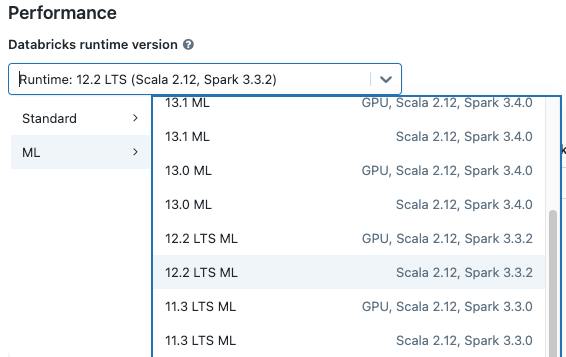Databricks Runtime for Machine Learning
This article describes Databricks Runtime for Machine Learning and provides guidance for how to create a cluster that uses it.
What is Databricks Runtime for Machine Learning?
Databricks Runtime for Machine Learning (Databricks Runtime ML) automates the creation of a cluster with pre-built machine learning and deep learning infrastructure including the most common ML and DL libraries.
Libraries included in Databricks Runtime ML
Databricks Runtime ML includes a variety of popular ML libraries. The libraries are updated with each release to include new features and fixes.
Databricks has designated a subset of the supported libraries as top-tier libraries. For these libraries, Databricks provides a faster update cadence, updating to the latest package releases with each runtime release (barring dependency conflicts). Databricks also provides advanced support, testing, and embedded optimizations for top-tier libraries. Top-tier libraries are added or removed only with major releases.
- For a full list of top-tier and other provided libraries, see the release notes for Databricks Runtime ML.
- For information about how often libraries are updated and when libraries are deprecated, see Databricks Runtime ML maintenance policy.
You can install additional libraries to create a custom environment for your notebook or cluster.
- To make a library available for all notebooks running on a cluster, create a cluster library. You can also use an init script to install libraries on clusters upon creation.
- To install a library that is available only to a specific notebook session, use Notebook-scoped Python libraries.
Set up compute resources for Databricks Runtime ML
The process for creating compute based on Databricks Runtime ML depends on whether your workspace is enabled for the Dedicated group cluster Public Preview or not. Workspaces that are enabled for the preview have a new simplified compute UI.
Create a cluster using Databricks Runtime ML
When you create a cluster, select a Databricks Runtime ML version from the Databricks runtime version drop-down menu. Both CPU and GPU-enabled ML runtimes are available.

If you select a cluster from the drop-down menu in the notebook, the Databricks Runtime version appears at the right of the cluster name:

If you select a GPU-enabled ML runtime, you are prompted to select a compatible Driver type and Worker type. Incompatible instance types are grayed out in the drop-down menu. GPU-enabled instance types are listed under the GPU accelerated label. For information about creating Azure Databricks GPU clusters, see GPU-enabled compute. Databricks Runtime ML includes GPU hardware drivers and NVIDIA libraries such as CUDA.
Create a new cluster with the new simplified compute UI
Use the steps in this section only if your workspace is enabled for the Dedicated group cluster preview.
To use the machine learning version of Databricks Runtime, select the Machine learning checkbox.

For GPU-based compute, select a GPU-enabled instance type. For the complete list of supported GPU types, see Supported instance types.
Photon and Databricks Runtime ML
When you create a CPU cluster running Databricks Runtime 15.2 ML or above, you can choose to enable Photon. Photon improves performance for applications using Spark SQL, Spark DataFrames, feature engineering, GraphFrames, and xgboost4j. It is not expected to improve performance on applications using Spark RDDs, Pandas UDFs, and non-JVM languages such as Python. Thus, Python packages such as XGBoost, PyTorch, and TensorFlow will not see an improvement with Photon.
Spark RDD APIs and Spark MLlib have limited compatibility with Photon. When processing large datasets using Spark RDD or Spark MLlib, you may experience Spark memory issues. See Spark memory issues.
Access mode for Databricks Runtime ML clusters
To access data in Unity Catalog on a cluster running Databricks Runtime ML, the access mode must be set to Dedicated (formerly single user access mode).
When a compute resource has Dedicated access, the resource can be assigned to a single user or a group. When assigned to a group (a group cluster), the user’s permissions automatically down-scopes to the group’s permissions, allowing the user to securely share the resource with other members of the group.
When using dedicated access mode, the following features are only available on Databricks Runtime 15.4 LTS ML and above: